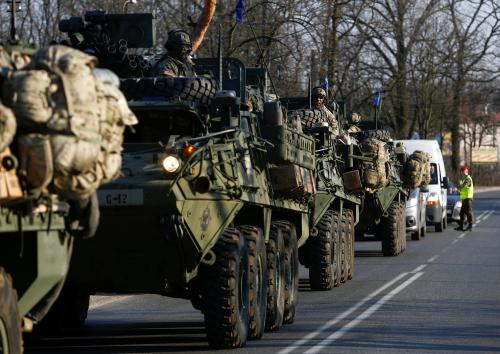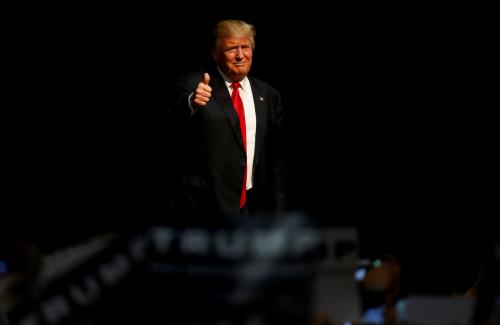Though our allies could do more, the United States benefits not just from military spending, write Kathleen Hicks and Michael O’Hanlon. U.S. allies are not just an advantage for America; they also are the central characteristic of its global leadership. This post originally appeared on USA Today.
Donald Trump questions the value of America’s alliances, and at one level it must be acknowledged that he has a point. There is not enough burden-sharing.
Most starkly, the United States spends 3 percent of gross domestic product on its armed forces, while the rest of NATO averages 1.4 percent of GDP even after agreeing formally to a 2 percent target. And the consequences are natural—for example, at the peak of the Afghanistan war, the U.S. provided 100,000 troops to the mission while the rest of NATO managed only about 35,000.
[W]hatever the imperfections of America’s allies, it is unconvincing to view them as a drain on the country.
But whatever the imperfections of America’s allies, it is unconvincing to view them as a drain on the country. On balance, they are not just an advantage for America; they also are the central characteristic of its global leadership. Russia and China are blessed with the likes of Belarus and North Korea as their formal security partners. Meanwhile, America has nearly 60, most of them among the world’s dominant technological and economic powers. Two-thirds of global GDP and two-thirds of global military spending is found within the broad, U.S.-led Western security coalition. This is unprecedented in the history of the world, especially in the absence of a clear agreed threat that would motivate such an alignment.
The stakes are very high. Trump is apparently willing to disband NATO as well as our key Asian alliances, and to withdraw from the Middle East as well—a “Trexit.” At risk is a core principle of America’s post-World War II strategy—that trying to stay out of others’ business did not work and, in fact, helped lead to the world wars. Trump in particular seems to reject the core elements of America’s strengths in the world market and international security system. With the tumult roiling Europe today, it is worth reviewing the basics on why our unparalleled alliance structure pays off.
Allies are not all alike. Although our Western European allies generally under-invest in common defense objectives, our Middle East partners and several in Asia do far better. The Middle East allies spend considerably more than the NATO members; South Korea comes in at about 2.5 percent, with Australia at 2 percent. Moreover, contrary to conventional wisdom, the U.S. does not squander huge sums of money basing troops on the territories of its wealthy allies. According to RAND analyses and our own estimates, it costs less than $10 billion a year to keep U.S. forces in key industrial nations. That amounts to less than 2 percent of the defense budget. And of that nearly $10 billion, half or more is paid by the host nations themselves.
Moreover, basing those U.S. forces abroad can be more efficient than keeping them at home, allowing a modestly smaller force to do the same job in some cases (as with the aircraft carrier based in Japan, for example)—saving substantially more than $10 billion annually, in fact.
Military might and spending are not the only measure of alliance contributions to security. It is worth remembering that many wealthy allies spend a lot more of their national wealth on development aid and refugee resettlement than does the United States—on average, in the range of 0.5 percent of GDP more than we do, which is real money even measured against the sizes of our military budgets. NATO allies also commit much more to United Nations peacekeeping missions than we do—roughly 10,000 troops, plus or minus, in recent decades. While they did not match us in Afghanistan, they collectively suffered more than 1,000 fatalities and have stuck with the mission for 15 long, hard years.
Those who question the basic value of our alliances or engagement overseas go too far.
Nor is it all about military power. European members of NATO are absorbing the greatest costs and risks in applying sanctions on Russia over its behavior in Ukraine. The U.S. tally is not even a 10th of the European Union’s Russian trade. Europe was also collectively crucial in applying sanctions on Iran.
Perhaps this would have happened anyway, without NATO, in the world Trump wants to create. Perhaps not.
It would be a different matter if America had lots of allies that went around causing wars and then expecting U.S. GIs and taxpayers to bail their chestnuts out of the fire once they overreached.
But that is not the case. Since the creation of the U.S. post-World War II alliance system, those few interstate wars that have happened have largely been caused by neutral or adversarial states—North Korea attacking South Korea, Arab states attacking Israel (in the days before many of the former became security partners with the United States), Iraq attacking Iran and Kuwait, China and Vietnam throwing their weight around their neighborhoods in earlier Cold War decades, and Russian President Vladimir Putin redrawing borders in Europe (after decades of the Soviet Union drawing an Iron Curtain across Europe).
In those rare cases where U.S. allies did employ force, as with Pakistan attacking India in earlier eras, or the British and French acting in former colonial states, it was generally understood that America would not help them, and we didn’t.
There are valid critiques about alliance burden-sharing, many of which are universally shared by foreign policy practitioners. Even so, the verdict is simple: Those who question the basic value of our alliances or engagement overseas go too far. In so doing, they distort the big picture. On balance, America’s alliances help this country undergird a global security system that has dramatically reduced the prevalence of war between nations in modern times, while currently costing the country only 3 percent of GDP.
A Trexit would be a disaster for Americans. To paraphrase Trump himself, our international security posture is a very good investment—and one that the U.S. global system of alliances does much to make possible.
The Brookings Institution is committed to quality, independence, and impact.
We are supported by a diverse array of funders. In line with our values and policies, each Brookings publication represents the sole views of its author(s).









Commentary
Donald Trump is wrong about NATO
July 9, 2016